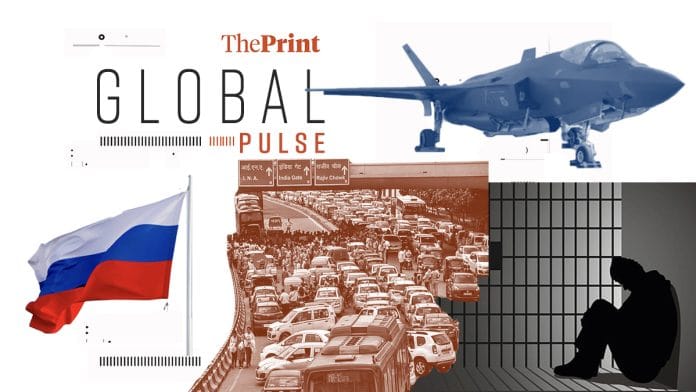New Delhi: As The Economist describes overcriminalisation in India, it says, “Welcome to India, where everything is against the law.” To put things in perspective, the death penalty is applicable to 301 crimes in India, and a paltry 46 in China.
“The central government’s ardour for lawmaking and punishment is infectious. India’s 28 states, which control vast swathes of policy, are no less assiduous in regulating everyday life,” it reads.
“The state of Uttarakhand, to pick one, requires couples in live-in relationships to register (and pay a fee) within 30 days of shacking up. Failure to comply attracts a fine and up to three months in prison. What of love lost? The unhappy couple must de-register (and pay another fee). Uttarakhand is particularly energetic but few states pass up the chance to make citizens visit the registrar.”
In The Telegraph, Tom Sharpe writes that India’s trade in Russian oil “reeks of duplicity”, and its dependence on Russian manufacturing weapons continues.
“In sum, Indian dependence on Russian weapons is slowly reducing but it could not be clearer that this isn’t from any desire to do the right thing. New Delhi’s unhelpful practices around illegal Russian oil are rapidly increasing,” the article reads.
“And, speaking to a recently retired senior official this morning, India’s neighbours get the same message—it’s India first and the rest of you be damned. Soon India is going to have to choose a side, or we’re going to have to treat them the way they’re basically treating us (the west): as an enemy.”
Vehicular pollution plays a part in making Delhi one of the most polluted cities in the world, but to clean up the air, “implementation matters”—and the “sudden and delayed” announcement of banning the sale of fuel to end-of-life vehicles could pose a problem, writes Veena Venugopal in Financial Times’ India Business Briefing newsletter.
“Were there better ways of achieving the same goal? Yes. One example is through a rigorous and regular process of certifying the fitness of vehicles. Should the government have ‘soft launched’ its threats through a phased approach? Perhaps; it would probably have made the move easier to swallow for the voting public. But in India, ground-level execution is a difficult exercise, and sometimes what it needs is a sudden jolt,” she adds.
The F-35B jet that has been stranded in Kerala is sparking curiosity and raising eyebrows as to how a modern British aircraft could be so helplessly trapped, reports Geeta Pandey for BBC.
“We continue to work with our Indian friends who provided first-class support when the F-35B was unable to return to the carrier,” British armed forces minister Luke Pollard is quoted as saying. “I am certain that the security of the jet is in good hands because Royal Air Force crew are with it at all times.”
(Edited by Nida Fatima Siddiqui)
Also Read: Lessons for Trump from Licence Raj as US tariffs loom & Foxconn’s blow to India’s iPhone ambitions






